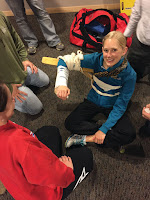GUEST POST: The Need For Rural Doctors Means Challenging, Rewarding Work
 Today is a College of Human Medicine (CHM) Rural Applicant Interview day.
Today is a College of Human Medicine (CHM) Rural Applicant Interview day.This is one of the days that the admissions office specifically designates for interviewing students that are from rural communities, have strong ties to rural areas, or are interested in one of our rural medicine training programs.
As Director of Rural Medicine for the College of Human Medicine, this is one of my favorite days.
Many of these students will become part of the Leadership in Rural Medicine certificate program, and will choose to complete their clinical training in Michigan’s rural communities—either in the Upper Peninsula, Northern Lower Peninsula, or the MidMichigan/Thumb area.
These students, if enrolled, will eventually graduate as the 44th class that has been involved in the college's rural training programs.
Things are different now than they were when CHM started the Rural Physician Program in the 1970’s. The College was one of the first medical schools to create a rural training program, and those educational pioneers didn’t fool around.
They chose the Upper Peninsula of Michigan for their trial site, and sent students there for the entire four years of medical school. They taught a curriculum 400 miles away from the main campus, by mailing tests and materials and relying on the skills of the excellent UP rural physicians.
Now our rural training programs look a bit different. Our students still are spread throughout the state of Michigan, embedded in communities in both the Upper and Lower peninsulas.
Rather than mailing, our testing is computer based. We use on-site simulation labs to teach procedural skills within rural communities, patient-actors to hone relational skills, and videoconferencing to interact together in small groups without traveling. We still rely on the skills of excellent teaching physicians throughout rural Michigan, but when questions arise we can now use telemedicine to enhance our resources.
The students involved in CHM’s Leadership in Rural Medicine programs use technology to enhance their ability to care for patients in some of the most remote areas of the state.
LRM students also learn additional skills that are needed in rural communities. Through deliberate emergency care training (including ski patrol), students gain triage and procedural experience. Rural students in the UP develop in-the-field assessment and treatment skills through an outdoor sports and wilderness medicine longitudinal training program.
Rural students work with public health networks, learn community leadership skills, grapple with problems unique to rural medicine such as dual relationships and logistical challenges, and graduate understanding how care is delivered to rural communities—the largest underserved population in the US.
Rural medicine is challenging.
Providing care to a low-resource community, especially one that is remote, often requires ingenuity, compassion, and grit. But the relationships you develop within that community, combined with the appreciable impact you can make, are invaluable rewards.
This may be why rural physicians continue to be the happiest physicians of any demographic group.1 Rural physicians also make slightly more on average than doctors practicing in big cities, a difference which increases to 12.7% when cost of living is factored in.2
We need rural doctors. And at CHM we feel that our best chance of solving this persistent healthcare disparity is by recruiting students interested in serving in rural communities, then providing them with the necessary rural training to be successful.
We know that combination works, as many of the graduates of our rural programs are currently caring for rural Michigan.3
Interestingly, as a group, rural medical students exhibit a few unique personality traits—self-directedness, persistence, and cooperativeness4—traits which not only help them become rural physicians, but also help them to ace their interviews.
It’s going to be a good day.
- Friedberg M, Chen P, VanBusum K, et al. Factors Affecting Physician Professional Satisfaction and Their Implications for Patient Care, Health Systems, and Health Policy. American Medical Society;2013.
- Reschovsky J, Staiti A. Physician incomes in rural and urban America. Issue Brief Cent Stud Health Syst Change.2005(92):1-4.
- Wendling AL, Phillips J, Short W, Fahey C, Mavis B. Thirty Years Training Rural Physicians: Outcomes From the Michigan State University College of Human Medicine Rural Physician Program. Acad Med. 2016;91(1):113-119.
- Eley DS, Brooks KD, Zink T, Cloninger CR. Toward a global understanding of students who participate in rural primary care longitudinal integrated clerkships: considering personality across 2 continents. J Rural Health. 2014;30(2):164-174.
Dr. Andrea Wendling is a rural family physician in Northern Michigan and an associate professor and director of the Rural Health Curriculum for Michigan State University’s College of Human Medicine. She has received many awards including The Arnold P. Gold Humanism Award for MSU-CHM in 2015, MSU-CHM’s Outstanding Community Volunteer Faculty award in 2012, the Distinguished Faculty Award in 2004, and the American Academy of Family Physician’s Pfizer Teacher Development Award in 2000. She is a past national chairperson for STFM’s Group on Rural Health and is a member of STFM’s Communications Committee. Dr. Wendling lectures on rural medicine and regularly precepts students in her rural practice.






It WAS a good day! A great day! Thank you, Dr. Wendling!
ReplyDelete